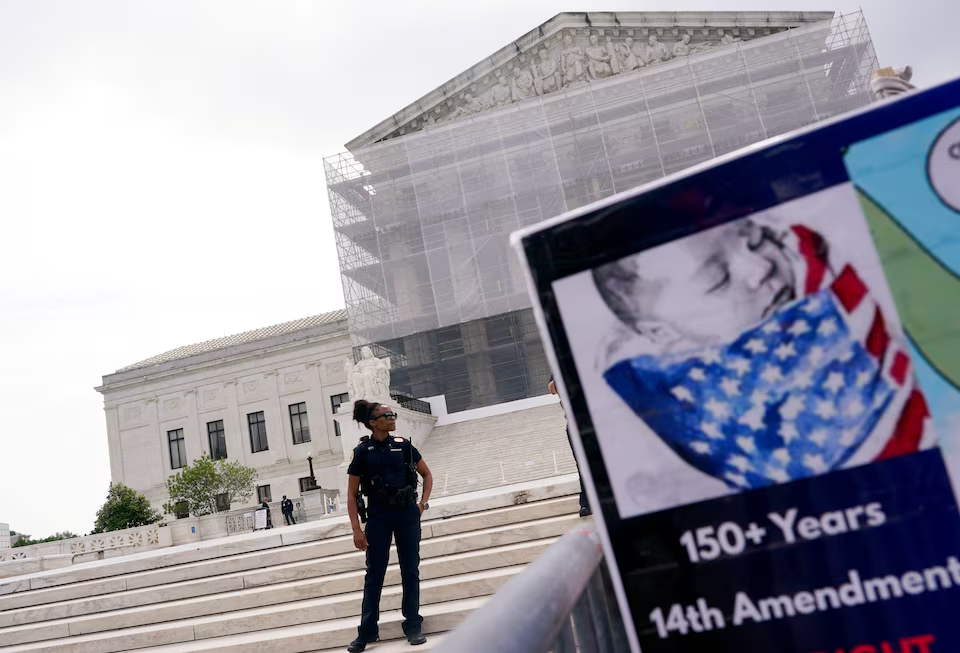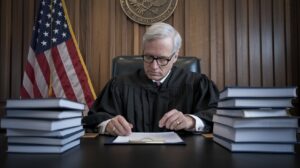Supreme Court Showdown: Birthright Citizenship Under Threat in Landmark Case
The U.S. Supreme Court is currently deliberating on the constitutionality of Executive Order 14160, issued by President Donald Trump on January 20, 2025. This order seeks to deny automatic U.S. citizenship to children born on American soil to non-citizen parents, including undocumented immigrants and those on temporary visas. The move challenges the long-standing interpretation of the 14th Amendment, which has historically granted citizenship to nearly all individuals born in the United States. Legal experts argue that altering this constitutional guarantee through an executive order is unprecedented and likely unconstitutional. Federal courts in Maryland, Massachusetts, and Washington have already blocked the order, citing potential violations of the 14th Amendment. The Supreme Court’s decision to hear the case underscores its significance and the potential for a landmark ruling. The outcome could redefine the fabric of American citizenship and set a precedent for future immigration policies. As the nation watches closely, the case tests the boundaries of executive power and the resilience of constitutional rights. The ruling will have far-reaching implications, affecting families, communities, and the nation’s identity.
Executive Order 14160: A Closer Look
Executive Order 14160, titled “Protecting the Meaning and Value of American Citizenship,” represents a significant shift in U.S. immigration policy. By attempting to redefine the criteria for birthright citizenship, the order challenges the established interpretation of the 14th Amendment’s Citizenship Clause. Legal experts argue that this move undermines the constitutional guarantee that all persons born in the United States are citizens, regardless of their parents’ immigration status. The order has faced immediate legal challenges, with federal courts issuing nationwide injunctions to block its implementation. These courts cite the order’s apparent violation of constitutional rights and the potential harm to affected individuals. The Trump administration contends that the order is necessary to address issues related to illegal immigration and the integrity of U.S. citizenship. However, critics argue that it sets a dangerous precedent by allowing the executive branch to unilaterally alter constitutional interpretations. The Supreme Court’s decision to hear the case underscores its significance and the potential for a landmark ruling. The outcome will determine not only the future of birthright citizenship but also the balance of power between the executive and judicial branches.
Legal Challenges and Nationwide Injunctions
A central issue in the Supreme Court’s review is the scope of judicial authority, particularly concerning nationwide injunctions. The Trump administration argues that lower courts have overstepped their bounds by issuing broad injunctions that halt federal policies across the entire country. They contend that such actions disrupt the balance of power and hinder the executive branch’s ability to enforce national policies. Opponents of this view maintain that nationwide injunctions are essential tools for protecting constitutional rights and ensuring uniform application of the law. They argue that limiting the scope of injunctions could lead to a fragmented legal landscape, where rights vary by jurisdiction. The Supreme Court’s decision on this matter will have profound implications for the judiciary’s role in checking executive power. It will also influence how future legal challenges to federal policies are adjudicated. The debate highlights the ongoing tension between different branches of government and the mechanisms in place to maintain constitutional order. As the Court deliberates, legal scholars and policymakers alike are closely monitoring the potential shifts in judicial authority.
Human Impact: Stories Behind the Legal Battle
Beyond the legal arguments and constitutional debates, the challenge to birthright citizenship has real-world implications for individuals and families. Consider the case of Barbara, a 35-year-old Cuban asylum seeker residing in Kentucky. Fleeing political and religious persecution, Barbara is now anxiously awaiting the birth of her child, uncertain about her baby’s citizenship status. If the executive order is upheld, her child could be rendered stateless, lacking access to essential services and legal protections. Barbara’s story is emblematic of the fears and uncertainties faced by many immigrant families across the United States. The potential denial of citizenship to children born on U.S. soil raises concerns about the creation of a disenfranchised population. Advocates warn that such outcomes could lead to increased marginalization and social instability. These personal narratives underscore the human stakes involved in the Supreme Court’s decision. They serve as poignant reminders that legal rulings extend beyond abstract principles, deeply affecting the lives of individuals and communities.
Historical Context: The 14th Amendment and Birthright Citizenship
The principle of birthright citizenship is enshrined in the 14th Amendment to the U.S. Constitution, ratified in 1868. This amendment was designed to grant citizenship to all persons born or naturalized in the United States, including formerly enslaved individuals. The Supreme Court affirmed this interpretation in the landmark 1898 case United States v. Wong Kim Ark, ruling that children born in the U.S. to foreign parents are citizens by birth. This precedent has stood for over a century, forming the bedrock of American citizenship law. The current challenge to birthright citizenship represents a significant departure from this historical understanding. Legal scholars argue that overturning this precedent would undermine the constitutional guarantee of equal citizenship. They caution that such a move could erode the principles of inclusivity and equality that define the American identity. The Supreme Court’s willingness to revisit this long-standing interpretation signals a potential shift in constitutional jurisprudence. The outcome of this case will determine whether the nation upholds its historical commitment to birthright citizenship or redefines the parameters of national belonging.
Broader Implications: The Future of Immigration Policy
The Supreme Court’s decision on birthright citizenship will have far-reaching consequences for U.S. immigration policy. If the executive order is upheld, it could pave the way for more restrictive measures targeting immigrant communities. Such a precedent may embolden future administrations to implement policies that further limit the rights of non-citizens and their U.S.-born children. Conversely, a ruling against the order would reaffirm the judiciary’s role in safeguarding constitutional protections. It would also reinforce the principle that citizenship rights are not subject to unilateral executive action. The case highlights the ongoing debate over the balance between national security, immigration control, and individual rights. It raises fundamental questions about who is entitled to the privileges and responsibilities of American citizenship. As the nation grapples with these issues, the Supreme Court’s ruling will serve as a defining moment in the evolution of U.S. immigration law. It will shape the contours of national identity and influence the trajectory of immigration policy for years to come.
Conclusion: Upholding Constitutional Principles
The Supreme Court’s review of the challenge to birthright citizenship is more than a legal proceeding; it is a test of the nation’s commitment to its constitutional principles. At stake is the enduring interpretation of the 14th Amendment and the rights it guarantees to all individuals born on American soil. The Court’s decision will either reaffirm the foundational concept of equal citizenship or signal a shift towards a more exclusionary understanding of national identity. This case underscores the importance of an independent judiciary in checking executive overreach and protecting individual rights. It also highlights the role of the courts in interpreting the Constitution in a manner that reflects the nation’s core values. As the justices deliberate, the nation awaits a ruling that will have profound implications for its legal framework and social fabric. The outcome will not only affect the lives of countless individuals but also define the principles that guide American democracy. In this critical moment, the Supreme Court has the opportunity to uphold the ideals of equality, justice, and constitutional integrity. The decision will resonate beyond the courtroom, shaping the nation’s identity and its commitment to the rights of all its people.
Key Data and Developments in the Birthright Citizenship Case
- Legal Challenges and Injunctions
President Trump’s Executive Order 14160, issued on January 20, 2025, aimed to end birthright citizenship for children born in the U.S. to non-citizen parents. The order has faced significant legal opposition, with multiple federal judges issuing nationwide injunctions to block its enforcement. Judges in Washington, Massachusetts, Maryland, and New Hampshire have described the order as “blatantly unconstitutional,” citing violations of the 14th Amendment’s Citizenship Clause. These rulings underscore the judiciary’s role in upholding constitutional protections against executive overreach.
- Implications for Immigrant Families
The potential implementation of the executive order raises concerns about the status of children born in the U.S. to non-citizen parents. If enforced, these children could be denied U.S. citizenship, leading to issues such as statelessness and lack of access to essential services. Advocacy groups warn that this could affect over 150,000 children annually, disrupting their futures and creating a legal limbo for families.
- Economic and Workforce Impact
The executive order’s potential effect on birthright citizenship could have broader economic implications. Skilled immigrants, particularly those in technology, healthcare, and education sectors, often rely on the citizenship status of their children for long-term planning. Denying citizenship could discourage highly skilled professionals from working in the U.S., potentially leading to a loss of talent and innovation.
- Historical and Legal Precedents
The principle of birthright citizenship is deeply rooted in U.S. history and law. The 14th Amendment, ratified in 1868, grants citizenship to all persons born or naturalized in the United States. This interpretation was affirmed by the Supreme Court in the 1898 case United States v. Wong Kim Ark.. Legal scholars argue that altering this principle would require a constitutional amendment, not an executive order.
- Political and Public Response
The executive order has sparked widespread political debate and public demonstrations. Opponents argue that it undermines fundamental American values of equality and inclusion. Protests have been held across the country, with individuals and organizations voicing their opposition to the potential changes in citizenship policy. The public response highlights the significance of birthright citizenship in American identity and the potential consequences of its alteration.
[USnewsSphere.com / reu.]





